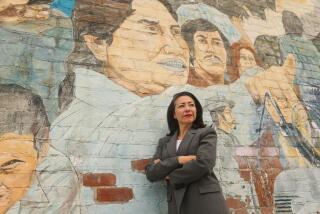Crisis for the Clerk : Emotional Stress Is Part of Price Reviczky Pays in Recount of Disputed Hotel Election Ballots
When Hermosa Beach City Clerk Kathleen Reviczky announced the results of a special election in a crowded council chambers two weeks ago, she struggled to keep from trembling.
A proposed $31-million beachfront hotel had lost by a handful of votes out of nearly 4,800 cast--a margin that later dwindled to just one when she counted several challenged ballots.
“I was emotionally exhausted,” said Reviczky this week, who like most onlookers had expected a more a decisive outcome. “I was so disappointed because I knew that the pressure was on me, that there would be a recount, that everything I had done would be scrutinized again.”
Today, for the second time in six months, Reviczky (pronounced ruh-VISS-kee) and four appointed election officers will recount ballots from a special election. A similar hotel development was rejected by voters in a special election in December--that time by 19 votes after a recount.
And, for the second time in six months, the 34-year-old, part-time city clerk risks alienating half of the city’s population with each move she makes. Both proponents and opponents of the 250-room hotel agree that development of the former site of the Biltmore hotel--debated for nearly two decades--has divided the city like no controversy before.
Personal Problems Exacerbated
“This issue has really done some damage to the social structure of this town,” said Reviczky, adding that many of the problems that led to her divorce this month were exacerbated by the hotel controversy and the demands it placed on her. “It has put long-term personal relationships and families on opposite sides. I have paid my price of alienation of certain persons already because of how long the issue has lasted.”
Both proponents and opponents of the hotel are expected to post “Reviczky watchers” at the council chambers today, carefully examining each ballot she rejects and contesting any decision they deem objectionable. Last December, even though the margin of defeat was greater, several dozen residents attended the recount session, many of whom questioned her every move, Reviczky said.
Four election officials, all local residents chosen by Reviczky, will conduct the actual hand count of ballots. One of them will hold the ballot in the air and read aloud the vote. The second official will confirm that the vote was read correctly and then stack the ballots in groups of 10. The third and fourth officials will compile independent tallies of the votes.
The four officials will be paid $35 each. They are: Joel Shapiro, a real estate broker and former planning commissioner who served as a polling judge during the June 11 election; Larry Jackson, an air traffic controller who served as a polling inspector; Leta Bloom, a homemaker who was a polling inspector, and June Dale, a retired professional fund raiser who also was a polling inspector.
Reviczky will serve as a roving master of ceremonies, keeping an eye on the recount workers, holding back anxious onlookers, and, most crucially, acting as the officer of appeal.
Any Vote Can Be Challenged
Representatives from both sides of the hotel issue have the right to challenge any of the votes recorded by the recount officials. If a challenge is registered, the ballot in question is placed in a special envelope and set aside until all votes from the precinct have been tabulated. Reviczky then opens the envelope and considers the disputed ballots.
Previously, the most common challenge has involved ballots with so-called “hanging chads.” When voters punch the perforated ballots to record their votes, the oval chip bearing “yes” or “no” does not always fall free. These “chads,” as election official call them, must be broken from the ballot on three of the four sides before they legally can be counted.
Depending upon how loose the chad is, the electronic tabulation machine can reject a ballot even if the piece is hanging by just one corner, Reviczky said. Seven ballots were disqualified by the machine on election night, five of which Reviczky said are probably hanging-chad candidates. She said there is no way of knowing before the recount how many sides of the chads have been broken.
In the past, a lot of attention has focused on the actual examination of the chads, Reviczky said. In the December recount, some onlookers accused her of bending the ballot excessively--in effect, attempting to break the chad free. Reviczky said that the sides of the chads are firmly attached, however, and that it would be virtually impossible to detach a side merely by examining the ballot.
“I had my hopes up that it wouldn’t happen to me again,” said Reviczky, who was elected to the $750-a-month job last year. “This is the second time I will have to stand up to the scrutiny of the high-paid lawyers who specialize in trying to throw out elections on technicalities.”
If any voter objects to Reviczky’s ruling on a hanging chad or any other disputed ballot, the sole avenue of appeal is through the courts. Reviczky said a judge could order her to hold another recount or to count individual ballots that she had disqualified. There has been some speculation that someone might challenge Reviczky’s ruling on two absentee ballots in favor of the hotel, both of which were disqualified election night because the voter used a pen to mark “yes” rather than punching the chad.
“A judge has the authority to decide if he wants to consider the intent of the voter. I don’t,” Reviczky said. “I have to conduct elections according to the guidelines of the election code and the county. I can’t interpret the codes or the guidelines to satisfy a political end.”
No Public Position
Reviczky is one of only a few City Hall officials who has not taken a public position on the proposed hotel, a decision that she says has left her isolated from most of her co-workers. Most city officials--elected and appointed--have embraced the development as a much needed source of tax revenue and as a catalyst for an economic renaissance in the downtown. The hotel would be built on city-owned property and several adjacent privately owned parcels on the Strand between 13th and 15th streets.
Some proponents of the project have cast Reviczky as a hotel opponent who is using her office to sabotage the project. Rumors have circulated in the closely knit community about a possible conflict of interest because Reviczky rents a home owned by Roger Creighton, an outspoken critic of the hotel development.
“Because I have not publicly supported the hotel, the people who favor it have taken the attitude that ‘since she is not with us, she must be against us,’ ” Reviczky said. “I have not taken a public stand on the issue in order to help run the elections impartially.”
Council Frustrated
Reviczky said that her insistence on “playing by the rules” has frustrated the City Council and often has soured her relationship with it. “I feel my relationship is not good with the City Council,” she said. “The City Council has wanted me to interpret the rules and set policy a little bit more to help them achieve their goals and I haven’t done that.”
Reviczky, the mother of two who has lived in Hermosa Beach since 1978, said her tenure as city clerk--which has already encompassed two initiatives, two referendums, one recall, two special elections, nine lawsuits and two recounts--has become more of an obsession than a part-time job.
“I am learning how to become a better public official,” she said. “I have to just play by the rules and that is what I am attempting to do. In this situation, the rules are going to be critical for one side or the other. I have already accepted the conclusion that I am not going to be able to make both happy.”
More to Read
Sign up for Essential California
The most important California stories and recommendations in your inbox every morning.
You may occasionally receive promotional content from the Los Angeles Times.










